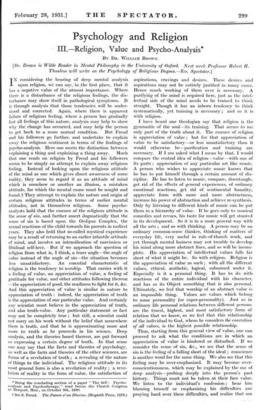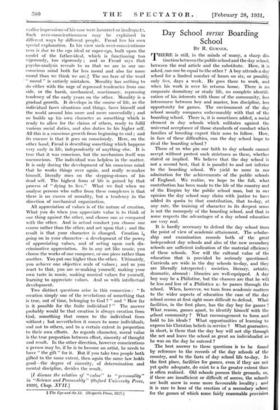BY DR. WILLIAM BROWN.
[Dr. Drown- is Wilde Reader in Mental Philosophy in the University of Oxford. Next week Professor Robert IL Thouless will write on the Psychology of Religious Dogma.—ED. Spectator.] N considering the bearing of deep mental analysis upon religion, we can say,'in the first place, that it has a negative value of the utmost importance. Where there is a disturbance of the religious feelings, the dis- turbance may show itself in pathological symptoms. It is through analysis that those tendencies will be under- stood and corrected. Again, where there is apparent failure of religious feeling, where a person has gradually lost all feelings of this nature, analysis may help to show why the change has occurred, and may help the person to get back to, a more normal condition. But Freud and his followers go further, and undertake to explain away the religious sentiment in terms of the findings of psycho-analysis. • Here one meets the distinction between explaining a thing and explaining a thing away. -Much that one reads on religion by Freud and his followers seems to be simply an attempt to explain away religious feeling. Instead of looking upon the religious attitude of the mind as one which gives direct awareness of some reality, they seem to regard it as an attitude of mind which is somehow or another an illusion, a mistaken attitude, for which the mental cause must be sought and found.t They attempt to explain the nature and origin of certain religious attitudes in terms of earlier mental attitudes, not in themselves religious. Some psycho- analysts hold that the essence of the religious attitude is the sense of sin, and further assert dogmatically that the sense of sin is based upon the Oedipus Complex, the sexual reactions of the child towards his parents in earliest years. They also hold that so-called mystical experience may be a result of returning to an earlier infantile attitude of mind, and involve an intensification of narcissism or libidinal self-love. But if we approach the question of religion from what is,- I think, a truer angle—the angle of value instead of the angle of sin—the situation becomes less unsatisfactory. An essential characteristic of religion is the tendency to worship. That carries with it a feeling of value, an appreciation of value, a feeling of gratitude for value, and other attitudes following thereon —the appreciation-of good, the readiness to fight for it, &c. And this appreciation of value is similar in nature to appreciation of truth : indeed, the appreciation of truth is the appreciation of one particular value. And certainly any scientist must believe in the appreciation of truth, and also truth-value. Any particular statement or fact may not be completely true ; but still, a scientist could not carry on his work without the belief that somewhere there is truth, and that he is approximating more and more to truth as he proceeds in his science. Deep analysis, and the theories based thereon, are put forward as expressing a certain degree of truth. In that sense one may 'say that the facts and theories of psychology, as well as the facts and theories of the other sciences, are forms of a revelation of truth ; a revealing Of the nature of things to the "itidividual. The religious -attitude in its most general form is also a revelation' of reality ; a reve- lation of reality in the form of value, the satisfaction of
* Being the concluding section of a paper "The Self : Psycho- analysis and Psychotherapy," read before the Church Congress at Newport, Mon.; on .0ctober 8th, 1930; t See S. Freud. The Future or an Illusion. (Hogarth Preis, 1929.)
aspirations, cravings and desires. These desires and aspirations may not be entirely justified in many cases. Hence much working of them over is necessary. A purifying of the mind is required here, just as the intel- lectual side of the mind needs to be trained to think straight. Though it has an inborn tendency to think systematically, yet training is necessary ; and so it is with religion.
I have heard one theologian say that religion is the gymnastic of the soul—its training. That seems to me only part of the truth about it. The essence of religion is appreciation of value ; but for that appreciation of value to be satisfactory—or less unsatisfactory than it would otherwise be—purification and training are necessary. If I am asked what I mean by that, I would compare the central idea of religion—value—with one of its parts : appreciation of any particular art like music. A person who wishes to appreciate music knows that he has to put himself through a certain amount of dis- cipline. He has to listen to music, compare, disentangle, get rid of the effects of general experiences, of ordinary emotional reactions, get rid of sentimental banality, appreciate form with more and more abstractness, increase his power of abstraction and achieve re-synthesis. Only by listening to different kinds of music can he put them in a hierarchy of value. If he goes only to musical comedies and revues, his taste for music will get stunted in its development. So it is in a more general way with all the arts ; and so with thinking. A person may be an ordinary common-sense thinker, thinking of matters of everyday life, very useful in rule-of-thumb work, and yet through mental laziness may not trouble to develop his mind along more abstract lines, and so will be incom- plete. His appreciation of intellectual values falls far short of what it might be. So with religion. Religion is the appreciation of value as such ; with all the different values, ethical, aesthetic, logical, subsumed under it. Especially is it a personal thing. It has to do with reactions of the entire individual with his character, and has as its Object something that is also personal. Ultimately, we feel that worship of an abstract value is an impossible thing. Values are values which belong to some personality (or super-personality). Just as in ordinary life personal relations between different persons are the truest, highest, and most satisfactory form of relation that we know, so we feel that this relationship of the individual to God, whom he considers the concretion of all values, is the highest possible relationship.
Thus, starting from this general view of value, one can proceed to ask what the conditions are in which an appreciation of value is hindered or disturbed. If we consider the sense of sin, &c., we see that the sense of sin is the feeling of a falling short of the ideal ; conscience is another word for the same thing. We also see that this feeling may be over-emphasized. It may become over- conscientiousness, which may be explained by the use of deep analysis—probing deeply into the person's past history. Things must not be taken at their face value. We listen to the individual's confession ; hear him blaming himself or emphasizing his difficulties and praying hard over these difficulties, and realize that ow earlier impressions of his case were incorrect or inadequr.t..... Such over-conscientiousness may be explained in different ways by different people. Freud has his own special explanation. In his view such over-conscientious- ness is due to the ego ideal or super-ego, built upon the model of the father-ideal, which is functioning too vigorously, too rigorously ; and so Freud says that psycho-analysis reveals to us that we are in our un- conscious mind both far less moral and also far more moral than we think we are.$ The use here of the word " moral " is entirely mistaken. Morality has nothing to do either with the urge of repressed tendencies from one side, or the harsh, mechanical, reactionary, repressing tendency of the early years on the other. Morality is a gradual growth. It develops in the course of life, as the individual faces situations and things, faces himself and the world around him more and more successfully ; and so builds up his own character as something which is ready to allow for the claims of others, ready to fulfil various social duties, and also duties to his higher self. All this is a conscious growth from beginning to end ; and its essence is that it goes on consciously. Here, on the other hand, Freud is describing something which happens very early in life, independently of anything else. It is true that it was conscious, but the mechanism itself was unconscious. The individual was helpless in the matter. It is only during the development of his conscious mind that he works things over again, and really re-makes himself, literally rises on the stepping-stones of his dead self. The highest form of life is gained by that process of "dying to live." What we find when we analyse persons who suffer from these complexes is that there is no excess of morality, but a tendency in the direction of mechanical organization.
All appreciation of values is of the nature of creation. What you do when you appreciate value is to think of one thing against the other, and choose one as compared with the other. And in actual conduct you choose one course rather than the other, and act upon that ; and the result is that your character is changed. Creation is going on in your character—a development of the power of appreciating values, and of acting upon such dis- criminative appreciation. So in any art like music, you choose the works of one composer, or one piece rather than another. You put one higher than the other. Ultimately, you achieve one objective scale of values ; and as you react to that, you are re-making yourself, making your own taste in music, making musical values for yourself, learning to appreciate values. And so with intellectual development.
Two distinct questions arise in this connexion : "Is creation simply one of the revelations of something that is true, out of time, belonging to God ? " and "How far is it possible for the finite individual ? " The answer probably would be that creation is always creation from God, something that comes to the individual from without ; but nevertheless it comes to some individuals, and not to others, and to a certain extent in proportion to their own efforts. As regards character, moral value is the true proportion between effort, sincerity of thought and result. In the other direction, however conscientious a person may be, if he is to become an artist, he needs to have "the gift" for it. But if you take two people both gifted to the same extent, then again the same law holds good—the degree of sincerity, of determination and mental discipline, decides the result.
[I discuss the relation of "value" to "personality" in "Science and Personality" (Oxford University Press, 1929), Chap. XVII.] t The Ego and the Id. (Hogarth Press, 1927.)












































 Previous page
Previous page